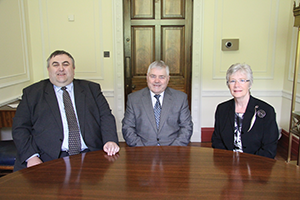Expenses reform recommended
The Independent Financial Review Panel (IFRP) has outlined its latest set of proposals for reforming the expenses system of the Assembly, including new checks on rent allowances, mileage claims and the electronic registration of attendance. agendaNi examines the panel’s recommendations.
The IFRP, established in 2011 by the Assembly Members Act, aims to ensure accountability and value for public money while also ensuring that MLAs are sufficiently remunerated for their work and provided with adequate resources to facilitate this. Chairman Pat McCartan stated: “There has been a high degree of interest in member’s expenses and the people of Northern Ireland deserve to know that their money is being spent appropriately and in the best interests of creating a democratic society.”
Empowered by the Assembly Members Act, the IFRP is capable of making determinations with regards to salaries and allowances payable to MLAs and likewise pensions, gratuities and allowances. These determinations, setting out the IFRP’s decisions, are implemented by the Assembly Commission and the Secretariat. Normally the IFRP publishes only one determination per Assembly mandate and, once issued, MLAs have no right of appeal to amend these.
Currently, MLAs are entitled to claim up to £67,161 to cover office cost expenditure, though this marks a £6,422 reduction since the 2012-2013 Assembly term. The IFRP is considering an overhaul of the entire system for Assembly expenses. Existing payments would be replaced with three new allowable expenses: constituency offices expenses, travel and subsistence expenses and employment support expenses. Consultation on the employment of support staff has already been conducted earlier in the year. Within these expense payments, the IFRP suggests the implementation of a new set of rules which would cap expenses in rent and staff salaries, increase probity and value for money, introduce simpler administrative arrangements and improved the transparency and of audibility of expenses.
For example, the IFRP has recommended that an £8,000 per-annum cap be placed upon an MLA renting premises for a constituency office. For MLAs who share premises with another member an allowable rental limit of £6,000 will be introduced for each member annually. Where an MLA shares a rented office property with an MP, MEP or Councillor (including rented premises within 100 metres of another elected official) the allowable rent will be capped at £4,000 for each member in the premises. On top of this, any office lease which facilitates the benefit of another connected or associated person, the allowable rental limit will also be set at £4,000.
With regards to constituency office opening hours, the IFRP has recommended that there be a minimum of 30 hours per week whereby members of the public can access or contact the office, in addition to one evening (5pm to 8pm) and one Saturday or Sunday (for a minimum of four hours) each month. In addition, the IFRP suggests that Assembly attendance be recorded with an electronic clock-in system and in the rare circumstance of no attendance, salary payments be withheld after three months. Equally, in order to qualify for full travel and subsistence expenses, the IFRP recommends that MLAs be required to register a 90 per cent attendance rate in each calendar year.
The consultation document also outlines a policy which would bring an end to payments for home-to-office mileage. The IFRP asserts that such payments are anomalous, unjustifiable and beyond the norm in either private or public sector employment. The IFRP has proposed that home to office mileage payments should cease from May 2016 and be replaced by a system of simple flat rate travel and subsistence expense in each constituency. This new structure would take into account the distance from constituency centroids to Parliament Buildings, attendance and the land area of each constituency. It is estimated that this measure alone could save £74,000 per year, or £370,000 during each mandate.
Elements of the consultation document have also attracted widespread criticism from across the political spectrum. For instance, a proposed prohibition of flags, party emblems and memorials within the constituency offices of MLAs has been tabled. Neutral spaces within constituency offices could enable better value for the public money which funds these offices. Pat McCartan contends: “It is business of ours to ensure that rents are properly paid from the public purse so we’re putting it out for public views, as to whether or not the offices ought to be user-friendly in the full sense of everybody in the community finding that they could attend any constituency office.”
However, both the TUV’s Jim Allister and Sinn Féin’s Catriona Ruane have accused the IFRP of having “lost the run of themselves”. Similarly, the DUP’s Peter Weir says: “There’s been a degree of mission creep by the panel and I think what we’ve got is something that is quite strange and over the top on that basis.” Alliance’s Kieran McCarthy said: “I wouldn’t be in favour of such a proposal, unless something is offensive or disrespectful, I don’t see a problem with party logos.”
Meanwhile, the SDLP’s John Dallat expressed support, arguing: “We are paid with public money and I believe it is wrong to have election posters in the window, wrong to be using constituency offices for party purposes and it’s certainly wrong to have any kind of emblems that would indicate a preference one way or another.” The Green Party have also come out in support of the IFRP’s wider plan. Steven Agnew stated: “The IFRP was established as some politicians demonstrated that without clear, defined boundaries they would take advantage of their privilege for personal gain … For that reason we should subject ourselves to whatever determinations the panel feel appropriate.”
The public consultation period for the proposals closes on 11 September, with final proposals expected to be published by December.







